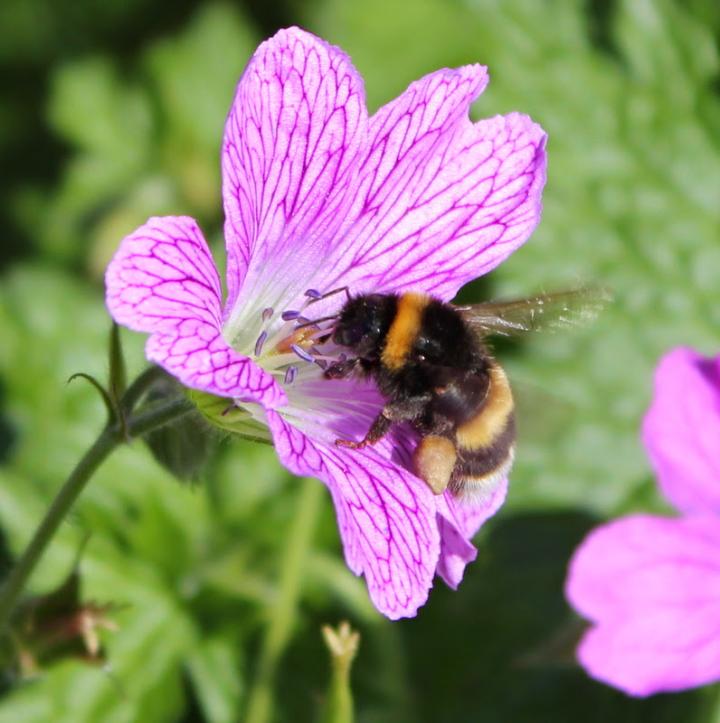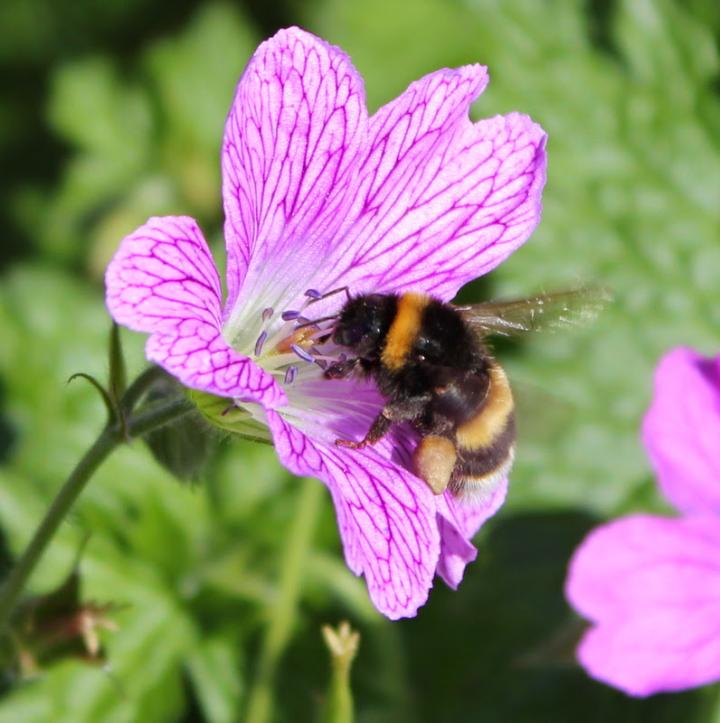
Credit: University of Sussex
Bees living in suburban habitats are still being exposed to significant levels of pesticides despite the EU ban on the use of neonicotinoid pesticides on flowering crops, new research from University of Sussex scientists shows.
While the introduction of new EU restrictions on the use of neonicotinoid chemicals five years ago has reduced exposure of bees living in farmland, the study found that overall more than half of all pollen and nectar samples collected from bee nests in Sussex, Hertfordshire and Scotland between 2013 and 2015 were contaminated.
The study is the first of its kind to highlight the risk to bees in urban areas posed by garden use of pesticides.
The scientists at the University of Sussex are urging gardeners to ditch their bug sprays immediately in favour of encouraging natural predators such as ladybirds or lacewings, and the use of physical methods such as hand-removal of pests, and netting or sticky traps.
Dr Beth Nicholls, Postdoctoral Research Fellow in Evolution, Behaviour and Environment at the University of Sussex and the study's lead author, said: "Our findings suggest that the EU's recent decision to extend the neonicotinoid moratorium to include all field crops is likely to have a positive effect on bees, relieving some of the stress on our already struggling pollinator populations. However, given that bees in suburban gardens appear to remain at risk post-moratorium, further work is needed to understand the sources of neonicotinoid exposure in these areas and to find ways to reduce it. Our study indicates that limiting the public sale and use of neonicotinoid-based bug sprays, which are currently unaffected by the moratorium, is needed if we are to protect bee populations living in and around our towns and cities."
In 2013 the European Commission instated a EU-wide moratorium on the use of three types of neonicotinoid (thiamethoxam, clothianidin and imidacloprid) on bee-attractive flowering crops such as oilseed rape. The ban will be expanded to include all field crops from 2019.
The study, with colleagues at Stirling University and Rothamsted Research, found that neonicotinoid exposure for rural bumblebees declined after the ban's implementation in 2015 but the risk to bumblebees in suburban gardens remained largely the same.
As well as bug sprays, contaminated ornamental plants sold in garden centres play a key role in spreading neonicotinoids through suburban areas. A previous study by the University of Sussex revealed that 70% of bee-friendly plants sold at a range of garden centres had traces of neonicotinoids.
For nectar samples collected from rural bumblebee colonies, concentrations of the pesticide thiacloprid, an active ingredient in many bug sprays sold in garden centres and not included in the EU restriction, significantly increased between 2013 and 2015, replacing the banned chemicals.
Researchers were also concerned to find bee food was often contaminated with imidacloprid, a neonicotinoid which is very rarely used against crop pests any more. Its continued presence raises concerns about the persistence of chemicals in agro-environments even after their application has stopped. The researchers believe that the continued contamination could also be due to pet flea treatments, which still often contain this chemical.
The study found many bee populations are still subject to pesticide levels that previous studies have shown could lead to slower colony growth and the production of fewer new queens, as well as detrimental impacts on foraging and navigation, immunity and worker mortality.
Professor Dave Goulson, professor of biology at the University of Sussex, said: "Who knows what Brexit will mean for the future of this country but one thing it desperately needs to include is the continuation of the EU's ban on neonicotinoids. Gardeners can do their bit; for there is no need for pesticides in gardens. I grow lots of fruits, vegetables and flowers in my garden without chemicals – there is just no need."
###
Media Contact
Neil Vowles
[email protected]
01-273-873-712
@sussexunipress
http://www.sussex.ac.uk
Related Journal Article
http://dx.doi.org/10.1021/acs.est.7b06573





